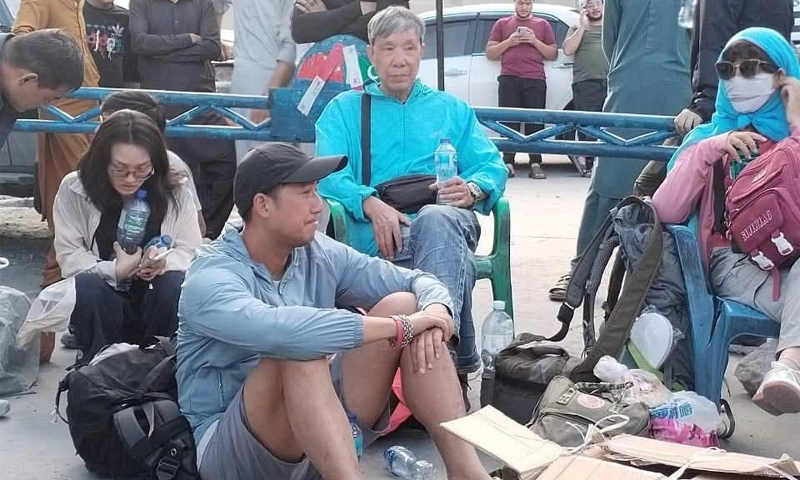- Web Desk
- Feb 19, 2026
No Pakistan-China border movement, as traders protest tax collection
-

- Tanveer Abbas
- Jul 28, 2025

GILGIT: The ongoing protest by Gilgit-Baltistan traders against the income and sales taxes collected at the Sost Dry Port intensified on Monday, as protestors halted work at the immigration and customs check posts, suspending travel and trade between Pakistan and China through the Khunjerab Pass.
The protestors, now in their eighth consecutive day of protests, claim that Gilgit-Baltistan is a “disputed territory” and, therefore, the collection of taxes here is illegal due to its disputed status.
As a result, a large number of foreign passengers, including Chinese nationals, who were traveling to China from Pakistan, have been stranded at Sost.
Javed Hussain, a former president of the G-B Chamber of Commerce and a prominent businessman, told HUM News English that they have stopped the entry of all vehicles, including those carrying foreign nationals and Chinese nationals.
“Our protest will continue until the resolution of our demands, including the exemption from income tax and sales tax and the clearance of containers that have been stuck at the port for several months. The protest could last 10, 20 days, or even months. We have implemented our Plan A and B, and Plan C remains, under which we have several options,” he added.
He said that negotiations are ongoing, but no tangible results have been achieved.
“The chief minister has constituted a committee, the governor has written a letter, and opposition members have also called for an assembly session. However, amid all this, no tangible results have been attained,” he added.
CM IN ACTION
Meanwhile, Chief Minister of Gilgit-Baltistan Haji Gulbar Khan has taken notice of the ongoing protest by traders in Sost and has instructed the already established committee to thoroughly review all matters and submit detailed recommendations and a report within one week.
In this regard, Special Assistant for Information Iman Shah, in a statement, mentioned that the chief minister had ordered immediate action in the public interest and in consideration of the traders’ legitimate concerns.
He said that a high-level committee, headed by Home Minister Shamsul Haq Lone had already been formed to address the issue.
Iman added that the committee’s recommendations would be shared with the federal government and the Federal Board of Revenue (FBR) to facilitate progress towards a sustainable solution. He made it clear that the government would seriously consider all legitimate demands of the traders and take all necessary measures to address them.
He emphasized that the Gilgit-Baltistan government was committed to safeguarding the interests of traders and, under the direction of the Chief Minister, resolving public issues on a priority basis.
LETTER SENT
Gilgit-Baltistan Governor Syed Mehdi Shah has also written a letter to President Asif Ali Zardari, drawing attention to a “critical issue concerning the importers and exporters of Gilgit-Baltistan, who are facing severe hardships due to an unresolved customs tariff issue at the Sost Dry Port in Hunza”.
“As a matter of fact, Section 40 D (5) of the Sales Tax Act, 1990 defines tax-exempted areas, and Gilgit-Baltistan has been defined as a tax-exempted area. Accordingly, the Federal Board of Revenue issued SRO vide Notification No. SRO.1/93(1)/2024 dated 8th August 2024, granting tax exemptions to Gilgit-Baltistan, but the said SRO has not been implemented on the ground,” the letter stated.
As a result, the governor explained, imported goods from China have been held up at Sost Dry Port for almost a year, incurring heavy demurrage charges for traders. “This situation has caused immense financial distress to the business community and threatens to trigger law and order challenges in the region if not resolved immediately,” he added.
Shah urged the president to intervene and ensure the immediate implementation of SRO.1/93(1)/2024 to facilitate the clearance of pending consignments as per the previous procedure and policy.
“Besides, Pakistan Customs may introduce an amnesty scheme to waive off penalties and demurrage charges, providing one-time relief to traders. Apart from that, a high-powered committee may be constituted to resolve the tariff issue faced by traders,” he concluded.




